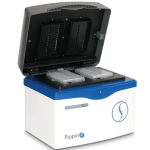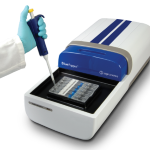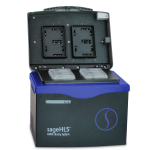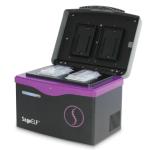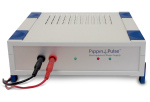Multi-omics maps of cotton fibre reveal epigenetic basis for staged single-cell differentiation
April 2016
Authors:
Maojun Wang, Pengcheng Wang, Lili Tu, Sitao Zhu, Lin Zhang, Zhonghua Li, Qinghua Zhang, Daojun Yuan, and Xianlong Zhang
Info:
Scientists from Huazhong Agricultural University in China studied the epigenetics of single-cell differentiation
in cotton, finding clear patterns of DNA methylation during development. They used PippinHT to isolate 100 bp – 200 bp fragments which were run in MNase-seq and ChIP-seq pipelines on an Illumina HiSeq 3000.
Citation:
Nucleic Acids Research, 2016
doi: 10.1093/nar/gkw238
Urbanization shapes the demographic history of a native rodent (the white-footed mouse, Peromyscus leucopus) in New York City
April 2016
Authors:
Stephen E. Harris, Alexander T. Xue, Diego Alvarado-Serrano, Joel T. Boehm, Tyler Joseph, Michael J. Hickerson, Jason Munshi-South
Info:
Researchers at the City University of New York studied populations of white-footed mice in New York City and surrounding areas, discovering that urbanization and climate change shaped population diversity and evolution of these animals. The team used ddRAD-seq with Pippin Prep for automated DNA size selection.
Citation:
Biology Letters
DOI: 10.1098/rsbl.2015.0983
Patterns of genome-wide variation in Glossina fuscipes fuscipes tsetse flies from Uganda
April 2016
Authors:
Gloria-Soria A, Dunn WA, Telleria EL, Evans BR, Okedi L, Echodu R, Warren WC, Montague MJ, Aksoy S, Caccone A
Info:
Researchers used ddRAD-seq to develop a panel of SNPs for use in population genomics or genome-wide association studies for the tsetse fly Glossina fuscipes fuscipes, a vector for Human African Trypanosomiasis. They performed size selection with BluePippin prior to sequencing.
Citation:
G3: Genes|Genomes|Genetics
doi:10.1534/g3.116.027235
Long-read sequence assembly of the gorilla genome
April 2016
Authors:
David Gordon, John Huddleston, Mark J. P. Chaisson, Christopher M. Hill, Zev N. Kronenberg, et al.
Info:
Scientists from the University of Washington and other institutions report a new gorilla genome assembly, which improves on the quality of previous assemblies by 150-fold by incorporating long-read sequencing. The team used BluePippin to remove smaller library fragments prior to sequencing on the PacBio system.
Citation:
Science 01 Apr 2016: Vol. 352, Issue 6281
DOI: 10.1126/science.aae0344
Multiplexed Sequence Encoding: A Framework for DNA Communication
April 2016
Authors:
Bijan Zakeri, Peter A. Carr, and Timothy K. Lu
Info:
MIT scientists present new methods to use synthetic DNA for communicating messages, including encoding and encrypting messages over several DNA fragments. BluePippin was used in sequencing the synthetic DNA.
Citation:
PLoS One
http://dx.doi.org/10.1371/journal.pone.0152774
